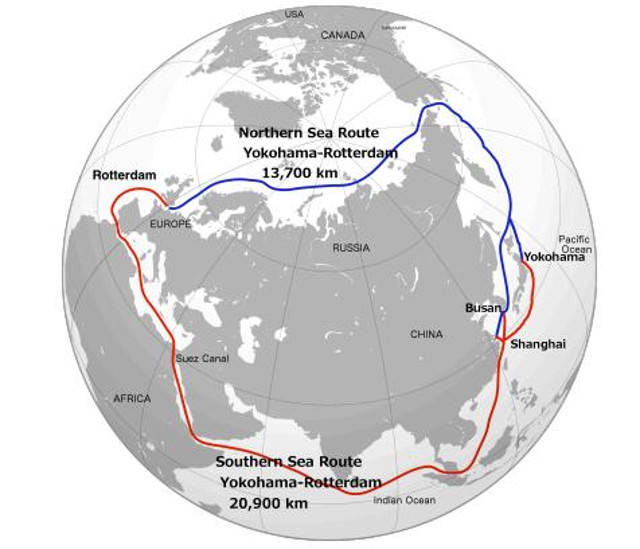According to a study by the Netherlands Bureau for Economic Policy Analysis (CPB), approximately two thirds of the world trade that passes through the Suez Canal, which is 8% of the global total, will be rerouted to the Northern Sea Route (NSR). The study outlines the effects of the economic shock that will be associated with the opening of the new trade route.
Aftereffects of the Arctic ice cap melting have an essential role to the Northern Sea merchant trading, which includes shipping services between North-East Asia and North-Western Europe. These shipping distances will be significantly decreased by a nearly one-third in comparison to the currently used routes, which will count serious reduction in the transportation and trade costs between the two major economic regions.
In the CPB study “Melting Ice Caps and the Economic Impact of Opening the Northern Sea Route” the effects on the economic in a multi-sector model with intermediate linkages are examined. The model shows that there is a possibility of a considerable change in the bilateral trade operations between Europe and Asia, together with the diversion of trade within Europe, the heavy shipping traffic in the Arctic region and a substantial drop in the Suez Canal ship traffic.
In accordance with the study predictions, these changes in the global merchant trading will impact the real income and prosperity of all involved commerce parties.

Image: Wiki
Beside the economic consequences, the estimated trade redirection will have as well a large-scale influence on the world’s geopolitics, such as the reorganisation of global supply chains in Europe and between Asia and Europe. Additionally it has to be mentioned the highlighted political interest and environmental pressure on the Arctic region.
If in fact the ice melting continues, the use of the sea route across the North Pole will be particularly important for the development of the international shipping industry.
The usage of the Northern Sea Route will represent a reduction of approximately one third of the average shipping distance and days of transportation compared to the currently used on the Southern Sea Route. About 8% of the global trade is transported through the Suez Canal and according to the CPB study, two-thirds of this volume will be re-routed over the shorter Arctic sea route.
Depending on the specific countries involved and because of these trade costs reductions, the study estimates a 10% increase of all trade flows between both regions.
NSR will become one of the busiest global shipping routes, which in turn implies increased economic and geopolitical interests regarding the Arctic and a huge economic pressure on countries currently operating the older Southern Sea Route.
Furthermore, the large volume of trade diversion through the NSR is expected to have negative economic effects on South and East Europe.
Аccording to this study, it becomes clear that there will be a significant movement of labour between the different sectors in some of the countries included in the global shipping industry.
It is estimated that the transport services through the North Sea Route will increase CO2 emissions.
Generally, because of the much shorter shipping distances in the NSR, there will be a reduction of the emissions regarding world's water transportation.